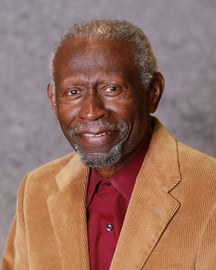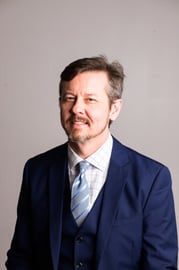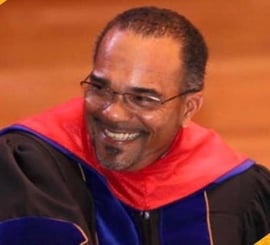- About
- Academics
- Admissions & Aid
- Life
- Research
- News & Events
- Homecoming
Program at a Glance
Get to the heart of what it means to live.
Our philosophy program empowers students to explore life’s fundamental questions while developing practical skills for diverse careers. With courses ranging from ethics and social justice to the philosophy of science and religion, students gain a broad perspective on the issues that shape our world.
The curriculum emphasizes analytical thinking, effective communication, and ethical reasoning, preparing students for leadership roles in law, education, business, and beyond. Small class sizes foster meaningful discussions with faculty and peers, creating a collaborative learning environment.
Embark on a journey of self-discovery and intellectual growth that lasts a lifetime.
Department
Learn More
The Morehouse philosophy program develops critical and analytical thinkers, adept at clearly communicating the many facets of human inquiry.
Earn the Philosophy Major
Learn More
The major requires 30 semester hours in philosophy plus six hours of cognate electives, which are philosophically relevant courses in other disciplines.
Earn the Philosophy Minor
Learn More
Students are required to take three courses - HPHI 202, 310, and 311 and three electives to minor in Philosophy.
About Philosophy
-
Overview
Overview of the Philosophy Program
THE MOREHOUSE PHILOSOPHY PROGRAM DEVELOPS CRITICAL AND ANALYTICAL THINKERS, ADEPT AT CLEARLY COMMUNICATING THE MANY FACETS OF HUMAN INQUIRY.
Philosophy is a strong foundation in matters of utmost personal, social, and global consequence. It gets at the very heart of what it means to live. Ethics, justice, the rationality of religion, and the application of philosophy in our lives are some of the many areas covered in our program.
Because of its existential nature, a philosophy major makes for an ideal choice that may heighten a student’s understanding of their primary field. Our courses rigorously engage pressing, relevant philosophical and ethical questions from Western and non-Western traditions.
From diverse thinkers, both past and present, philosophy majors and students develop skills in understanding complex theories and arguments. They develop their own informed and well-justified arguments and positions on philosophical issues that affect their own lives and the lives of their local, national, and global communities.
A philosophy major encourages intellectual curiosity and fosters the ability to think critically about abstract and practical issues alike. Students are challenged to explore timeless philosophical questions while addressing contemporary concerns, such as the ethical implications of technology and global inequality.
This major also cultivates transferable skills like logical reasoning, persuasive writing, and ethical analysis—qualities highly sought after in professions ranging from law and education to business and public policy.
By pursuing a philosophy major, students gain a deeper understanding of themselves and prepare to make meaningful contributions to society through thoughtful and informed action.
-
Outcomes

Outcomes
OUTCOMES
The philosophy major is ideal preparation for any career or field of advanced study.
- Students of philosophy gain knowledge and understanding of what influential past and present philosophical thinkers argued from a variety of philosophical traditions. Based on this understanding, philosophy majors and students develop their own arguments and positions on important issues confronting society, as well as personal existential, ethical, religious, political, and vocational questions.
- Philosophy majors and minors focus on critical thinking. Philosophy rigorously asks why about common assumptions and disputed philosophical beliefs and develops skills to evaluate answers rigorously. Skills for evaluating abstract theories and explanations are applied to practical issues of the day with an emphasis on ethics, social justice, racial identity and racial injustice, questions about religious diversity, and knowledge claims from all fields and practices.
- Above all, an emphasis is placed on developing the ability to clearly and persuasively communicate and argue positions on controversial and debated issues. These skills are relevant and valuable for philosophy majors studying any subject matter and for engaging profound issues of personal concern.
-
Earn the Major
BACHELOR OF ARTS IN PHILOSOPHY
CURRICULUM
Philosophy Major Course of Study Requirements
The philosophy major requires 30 semester hours in the program plus six hours of cognate electives, which are philosophically relevant courses in other disciplines.
There are four required courses in philosophy: HPHI 202— Critical Thinking, HPHI 310— Ancient and Medieval Philosophy, HPHI 311— Modern Philosophy, and HPHI 312— Nineteenth-Century Philosophy. Students are encouraged to enter this history of philosophy sequence as soon as they declare their philosophy major since these courses are offered in rotation. The speech requirement for the major may be met with one of the following courses: HCOM 253— Public Speaking, HCOM 353— Interpersonal Communication, HCOM 360— Interracial Communication, HCOM 354— Intercultural Communication, HCOM 355— Argumentation and Debate.
In addition to course requirements, philosophy majors are required to write a research paper during their senior year under the direction of an instructor and according to the program’s regulations.
General Education (Core)
33-48 hoursRefer to the general education requirements for more information.
Philosophy Major
15 hoursThe following courses are required:
- HPHI 202— Critical Thinking
- HPHI 310— Ancient and Medieval Philosophy
- HPHI 311— Modern Philosophy
- HPHI 312— Nineteenth-Century Philosophy
Choose one course from the list below:
- HCOM 253— Public Speaking
- HCOM 353— Interpersonal Communication
- HCOM 360— Interracial Communication
- HCOM 354— Intercultural Communication
- HCOM 355— Argumentation Debate
Philosophy Electives
18 hoursChoose six course from the list below:
- HPHI 201— Introduction to Philosophy
- HPHI 301— Formal Logic
- HPHI 302— Introduction to Philosophical Ethics
- HPHI 303— Theory of Knowledge
- HPHI 315— Philosophy of Science
- HPHI 316— Aesthetics
- HPHI 400— Contemporary Philosophy
- HPHI 410— Philosophy of Religion
- HPHI 461— History of Political Thought
- HPHI 462— Modern Political Theory
- HPHI 465 Directed Study
- HPHI 475— Topics in Philosophy
- HCOM 253— Public Speaking*
Cognate electives are chosen with the advisement of the faculty advisor.
*Another communication course may be substituted with permission of the student’s advisor. -
Earn the Minor
MINOR IN PHILOSOPHY
CURRICULUM
The following courses are required:
- HPHI 202— Critical Thinking
- HPHI 310— Ancient and Medieval Philosophy
- HPHI 311— Modern Philosophy
Choose three courses from the list below:
- HPHI 201— Introduction to Philosophy
- HPHI 301— Formal Logic
- HPHI 302— Introduction to Philosophical Ethics
- HPHI 303— Theory of Knowledge
- HPHI 315— Philosophy of Science
- HPHI 316— Aesthetics
- HPHI 400— Contemporary Philosophy
- HPHI 410— Philosophy of Religion
- HPHI 461— History of Political Thought
- HPHI 462— Modern Political Theory
- HPHI 465— Directed Study
- HPHI 475— Topics in Philosophy
Overview of the Philosophy Program
THE MOREHOUSE PHILOSOPHY PROGRAM DEVELOPS CRITICAL AND ANALYTICAL THINKERS, ADEPT AT CLEARLY COMMUNICATING THE MANY FACETS OF HUMAN INQUIRY.
Philosophy is a strong foundation in matters of utmost personal, social, and global consequence. It gets at the very heart of what it means to live. Ethics, justice, the rationality of religion, and the application of philosophy in our lives are some of the many areas covered in our program.
Because of its existential nature, a philosophy major makes for an ideal choice that may heighten a student’s understanding of their primary field. Our courses rigorously engage pressing, relevant philosophical and ethical questions from Western and non-Western traditions.
From diverse thinkers, both past and present, philosophy majors and students develop skills in understanding complex theories and arguments. They develop their own informed and well-justified arguments and positions on philosophical issues that affect their own lives and the lives of their local, national, and global communities.
A philosophy major encourages intellectual curiosity and fosters the ability to think critically about abstract and practical issues alike. Students are challenged to explore timeless philosophical questions while addressing contemporary concerns, such as the ethical implications of technology and global inequality.
This major also cultivates transferable skills like logical reasoning, persuasive writing, and ethical analysis—qualities highly sought after in professions ranging from law and education to business and public policy.
By pursuing a philosophy major, students gain a deeper understanding of themselves and prepare to make meaningful contributions to society through thoughtful and informed action.

Outcomes
OUTCOMES
The philosophy major is ideal preparation for any career or field of advanced study.
- Students of philosophy gain knowledge and understanding of what influential past and present philosophical thinkers argued from a variety of philosophical traditions. Based on this understanding, philosophy majors and students develop their own arguments and positions on important issues confronting society, as well as personal existential, ethical, religious, political, and vocational questions.
- Philosophy majors and minors focus on critical thinking. Philosophy rigorously asks why about common assumptions and disputed philosophical beliefs and develops skills to evaluate answers rigorously. Skills for evaluating abstract theories and explanations are applied to practical issues of the day with an emphasis on ethics, social justice, racial identity and racial injustice, questions about religious diversity, and knowledge claims from all fields and practices.
- Above all, an emphasis is placed on developing the ability to clearly and persuasively communicate and argue positions on controversial and debated issues. These skills are relevant and valuable for philosophy majors studying any subject matter and for engaging profound issues of personal concern.
BACHELOR OF ARTS IN PHILOSOPHY
CURRICULUM
Philosophy Major Course of Study Requirements
The philosophy major requires 30 semester hours in the program plus six hours of cognate electives, which are philosophically relevant courses in other disciplines.
There are four required courses in philosophy: HPHI 202— Critical Thinking, HPHI 310— Ancient and Medieval Philosophy, HPHI 311— Modern Philosophy, and HPHI 312— Nineteenth-Century Philosophy. Students are encouraged to enter this history of philosophy sequence as soon as they declare their philosophy major since these courses are offered in rotation. The speech requirement for the major may be met with one of the following courses: HCOM 253— Public Speaking, HCOM 353— Interpersonal Communication, HCOM 360— Interracial Communication, HCOM 354— Intercultural Communication, HCOM 355— Argumentation and Debate.
In addition to course requirements, philosophy majors are required to write a research paper during their senior year under the direction of an instructor and according to the program’s regulations.
General Education (Core)
33-48 hours
Refer to the general education requirements for more information.
Philosophy Major
15 hours
The following courses are required:
- HPHI 202— Critical Thinking
- HPHI 310— Ancient and Medieval Philosophy
- HPHI 311— Modern Philosophy
- HPHI 312— Nineteenth-Century Philosophy
Choose one course from the list below:
- HCOM 253— Public Speaking
- HCOM 353— Interpersonal Communication
- HCOM 360— Interracial Communication
- HCOM 354— Intercultural Communication
- HCOM 355— Argumentation Debate
Philosophy Electives
18 hours
Choose six course from the list below:
- HPHI 201— Introduction to Philosophy
- HPHI 301— Formal Logic
- HPHI 302— Introduction to Philosophical Ethics
- HPHI 303— Theory of Knowledge
- HPHI 315— Philosophy of Science
- HPHI 316— Aesthetics
- HPHI 400— Contemporary Philosophy
- HPHI 410— Philosophy of Religion
- HPHI 461— History of Political Thought
- HPHI 462— Modern Political Theory
- HPHI 465 Directed Study
- HPHI 475— Topics in Philosophy
- HCOM 253— Public Speaking*
Cognate electives are chosen with the advisement of the faculty advisor.
*Another communication course may be substituted with permission of the student’s advisor.
MINOR IN PHILOSOPHY
CURRICULUM
The following courses are required:
- HPHI 202— Critical Thinking
- HPHI 310— Ancient and Medieval Philosophy
- HPHI 311— Modern Philosophy
Choose three courses from the list below:
- HPHI 201— Introduction to Philosophy
- HPHI 301— Formal Logic
- HPHI 302— Introduction to Philosophical Ethics
- HPHI 303— Theory of Knowledge
- HPHI 315— Philosophy of Science
- HPHI 316— Aesthetics
- HPHI 400— Contemporary Philosophy
- HPHI 410— Philosophy of Religion
- HPHI 461— History of Political Thought
- HPHI 462— Modern Political Theory
- HPHI 465— Directed Study
- HPHI 475— Topics in Philosophy
Philosophy Majors Course Description
Description
201. Introduction to Philosophy
Introduction to the scope and nature of philosophical thinking through discussion of a variety of philosophical issues and arguments.
202. Critical Thinking
Introduction to deductive reasoning and the scientific method. Includes the fundamental types of deductive inference (including traditional syllogisms), fallacies, the art of definition, and the scientific method.
301. Formal Logic
A course dealing with the symbolic representation of argument forms and the assessment of their validity. Sentential logic is treated with and without quantification. The main topic of the course is the development of formal proofs. Prerequisite: PHI 201 or consent of the instructor.
302. Introduction to Philosophical Ethics
Provides an introduction to philosophical reflection about the nature and function of morality. Readings will include both historical and contemporary materials.
303. Theory of Knowledge
Survey of key philosophical issues related to the nature and foundation of human knowledge. Prerequisite: PHI 201 or consent of the instructor.
310. Ancient and Medieval Philosophy
Survey of thinkers and philosophical schools from the pre-Socratics to Augustine. Prerequisite: PHI 201 or consent of the instructor.
311. Modern Philosophy
Survey of major Western thinkers and schools of thought from Boethiusto Hume. Prerequisite: PHI 201 or consent of the instructor.
312. Nineteenth-Century Philosophy
Survey of major thinkers and schools of thought in Western philosophy from Kant to the end of the nineteenth century. (A writing-intensive course) Prerequisite: PHI 201 or consent of the instructor.
315. Philosophy of Science
Explores fundamental philosophical questions raised by the rise and success of the sciences. Some background in empirical science is recommended. Prerequisite: PHI 201 or consent of the instructor.
316. Aesthetics
Introduction to the philosophical study of art, beauty, and the imagination. It centers upon the nature of art and beauty, the significance of human imagination, and the question of truth in art. Analytical Philosophy, Hermeneutics, Existentialism, and other schools of thought. Prerequisite: PHI 201 or consent of the instructor.
400. Contemporary Philosophy
Covers major Western thinkers and schools of thought in the twentieth century: Phenomenology, Analytical Philosophy, Hermeneutics, Existentialism and other schools of thought. (A writing-intensive course) Prerequisite: PHI 201 or consent of the instructor.
410. Philosophy of Religion
Examination of philosophical questions involved in religion and religious beliefs. Prerequisite: PHI 201 or consent of the instructor.
461. History of Political Thought
Greek and Roman political philosophy. Church and state in the Middle Ages; Machiavelli and the emergence of the modern state. Prerequisite: PSC 461 (Offered by the political science department.)
462. Modern Political Theory
Political philosophy in the Reformation period and the modern world. Locke, Hobbes, Montesquieu, Rousseau, Hegel, and Marx are the main thinkers considered. Prerequisite: PSC 461 (Offered by the political science department.)
465. Directed Study
Designed for students to conduct extensive research in the area of their choice. Taught on an individual basis pre-arranged between student and instructor.
475. Topics in Philosophy
Study of a special topic chosen by the instructor.
Meet Our Faculty and Staff
Dr. Harold Bennett, Martin Luther King, Jr. Endowed Chair of Religion
Adameka McGee, Department Coordinator

Harold V. Bennett
Professor

Lawrence Edward Carter, Sr.
Professor

Kipton E. Jensen
Professor

Nathan Nobis
Professor

Charles Thomas
Associate Professor,
Director of Online General Education
Director of Online General Education
